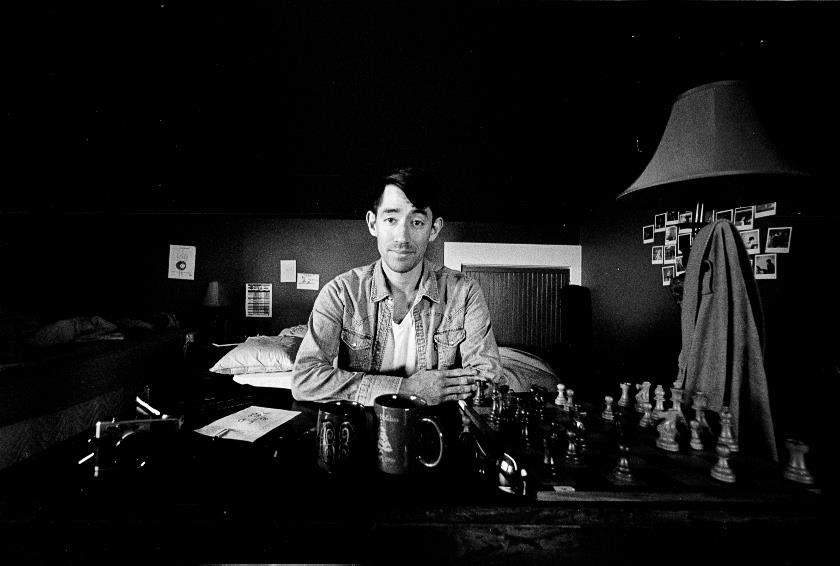
Kenny Riches: Transforming Miami’s indie filmmaking community one roundtable at a time

Kenny Riches. Photo by Colin Fugit.
A couple of years ago, BuzzFeed offered 37 reasons why Miami is the best and weirdest city in America. The list is, of course, that “Miami Vice”-like cliché that we’ll never shake, which is fine, but we’re so much more than chicken gangs, tricked-out cars and old men who wear Speedos while riding bikes. BuzzFeed, we also have an art scene—a thriving art scene of visual artists, performers, choreographers, musicians, poets, filmmakers and more whose work building the community really makes us the best, weirdest and most awesome city in America.
Miami has stories—wild stories, serious stories, cheesy, funny, uplifting and downright tragic stories. And one day one (or many) of those stories will end up on the big screen and possibly redefine who we are as a city. Kenny Riches is an artist and filmmaker who is working onscreen and behind the camera to support Miami’s thriving indie film industry. Thanks to a recently awarded Knight Arts Challenge grant, Riches will launch a series of roundtables for local screenwriters to get real time feedback on their scripts–scripts that may change America’s (and BuzzFeed’s) perception of Miami.
You won an $8,000 Knight Arts Challenge grant to strengthen the indie film community in South Florida with a roundtable for screenwriters. Tell us a bit about your project. The roundtable is designed for screenwriters and filmmakers to share what they are currently working on and get feedback from their peers. In order to participate, the writers must also trade off as readers, and after each table-reading, the discussion is opened up to share critical feedback. Everyone is expected to bring new pages, participate in reading and give/get feedback to and from one another.
How will the roundtable benefit the local and national indie filmmaking community? Miami is already making waves in the indie film world, and my hope is that programs like this will help push it even further. The goal of the roundtable is to encourage productivity, as well as open critical dialogue to advance the quality of writing and films coming out of South Florida. There is a strong regional aesthetic in Florida, and I think the next few years are going to be important for indie filmmakers here.
Where will the roundtables take place, how many will be held, and who will lead them? We’re going to start with one roundtable session every two weeks (beginning in mid-January) to give writers a chance to create new work and for the word to spread. I’ll lead the roundtables for now along with some local feature-filmmakers, but our plan is to invite a few guest filmmakers throughout the year to offer up suggestions and insight to the group. Until we find our footing, we will have to be a bit nomadic with where the roundtables will be held, but hopefully we’ll find a permanent home before too long.
How did you get into the film industry? What would you say to high school students looking to make their way into the field? I studied painting and drawing in college, but I had a strong interest in cinema outside of school. I began making short films with my friends and eventually jumped into making feature-length films. My advice to a high school student with an interest in filmmaking is to start interning on productions to get a sense of what it means to be on set. The only way to improve as a filmmaker is to make films. Writing, shooting, editing short films is a great way to hone your craft and develop a style.
Although the indie film industry in South Florida is making waves, I’d like to get your assessment of racial diversity and female representation within the local filmmaking industry? Unfortunately, we have a long way to go before the good ol’ boys that run Hollywood die off. I think there is certainly a huge problem that people of privilege have a hard time acknowledging, but I think it’s changing and it’s definitely being addressed in indie circles.
How will the roundtables address diversity (if at all)? I think personal character-driven stories offer the chance to bring diversity into the fold. I can’t tell anyone how or what they should write, and that’s not our goal with the roundtable, but I certainly encourage filmmakers from all walks of life to tell their stories the way they need to be told. Miami’s filmmakers are so diverse to begin with.
What are you working on now besides the launch of the roundtable? Besides launching the roundtable, I’m currently finishing up the distribution of my last film, “The Strongest Man,” and writing my next film or making stuff in the studio. When I’m not working on that, I’m helping to provide short film grants for emerging filmmakers through an organization called the David Ross Fetzer Foundation, created in memory of my friend. It’s a national organization, so I’m hoping more Florida filmmakers apply this year.
And what’s next for you? I’d like to get back to watching more movies and writing. I hope to shoot my next feature film this year, so I have my work cut out for me.
Recent Content
-
Artsarticle ·
-
Artsarticle ·
-
Artsarticle ·

